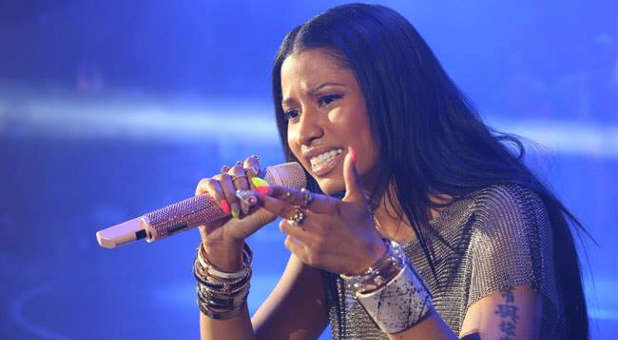I try to stay current with American pop culture, but that’s not easy when one of the most-watched music videos in the country is flat-out pornographic. I’m talking about rap star Nicki Minaj’s new hit, “Anaconda,” which debuted in August. The video features dozens of women shaking and gyrating their naked rear ends in the camera while Minaj raps:
Oh my gosh, look at her butt
Oh my gosh, look at her butt
The song basically reinforces the stereotypical notion that black women have large posteriors, and that such women are open game to be exploited by men who prefer this body type. The song is crude, raunchy, vulgar and sexist—and it got 100 million views in 11 days after it was released, putting it at No. 3 on Billboard’s Hot 100 list. (You can figure out what that says about the state of our culture.)
Minaj, 31, is a powerful force in pop music today. The New York Times called her the most influential female rapper of all time, partly because she is the first female solo artist to have seven singles on the pop charts at one time. Born in Trinidad, she is known for her outrageous hair and costumes (she has sported blonde, pink, green, blue, orange, lavender and black hair) and her unusual personality (she claims that a gay man named Roman Zolanski lives inside her as an alter ego).
But what intrigues me most about Minaj is her religious background. Her mother, Carol Maraj, is a born-again Christian who found God during a traumatic time when her husband was abusing her. In a recent interview in The Christian Post, Maraj said her encounter with Jesus healed her marriage and gave her a ministry to women who suffer in abusive situations.
Meanwhile, her daughter Nicki (her real name is Onika Tanya Maraj) also claims to be a Christian, and last year she urged her fans to read a Christian book by a pastor friend. Yet in the midst of all of her God-talk and backstage prayers, Minaj’s sleazy new video makes Miley Cyrus’ infamous incident of 2013 look like a Sesame Street episode.
Excuse me if I sound a bit over-the-top, but I think “Anaconda” has set women’s rights back at least a decade. It’s shameful that the American music industry allowed Minaj to produce a song that is so degrading to women. And it’s beyond shameful that the daughter of a woman who suffered abuse from a drug-addicted man would turn around and produce music that encourages abuse and exploitation.
Nicki Minaj could have changed the course of rap music if she’d taken her cues from her Christian mom instead of her male counterparts in the rap industry.
We all know that until recently male artists dominated rap music and that the genre is known to be anti-women. Many of today’s profanity-laced rap songs offer graphic references to raping women, slapping them and breaking their bones. Women are often referred to as “hos”—whores. One song describes a man who sticks a gun down a woman’s throat while another song praises a man who hits a woman until her nose bleeds.
In 2007 two researchers, Chris Kubrin and Ronald Weitzer, studied the lyrics of hundreds of rap songs and presented their findings to the American Society of Criminology. They concluded that rap music most definitely promotes misogyny, or hatred of women. The songs they studied contained these five common themes related to the abuse of women: 1) derogatory naming and shaming of women; 2) sexual objectification of women; 3) distrust of women; 4) legitimization of violence against women; and 5) celebration of prostitution and pimping.
When Nicki Minaj came along, she could have used her powerful voice to confront abuse. She could have gone against the grain. But she sold out to the industry status quo, and her music is doing more to objectify women than many of the songs from the guys who think rape is sexy.
But I’m not giving up on Nicki—especially since I know her mother is still praying for her. Carol Maraj recently told The Christian Post: “The Bible says to train up a child in the way he should go and when he is old would not depart from it. I trust that one day [Nicki] will sing unto the Father, because a seed has already been planted. Nothing is too big to God.”
Let’s agree with Carol Maraj and pray for a miracle. If God gets a hold of Nicki Minaj, her music could be used to restore women’s dignity instead of tearing it down.
J. Lee Grady is the former editor of Charisma. You can follow him on Twitter at leegrady. His newest book, The Truth Sets Women Free, was released this week from Charisma House. You can learn more about his ministry, The Mordecai Project, at themordecaiproject.org.
See an error in this article?
To contact us or to submit an article





















